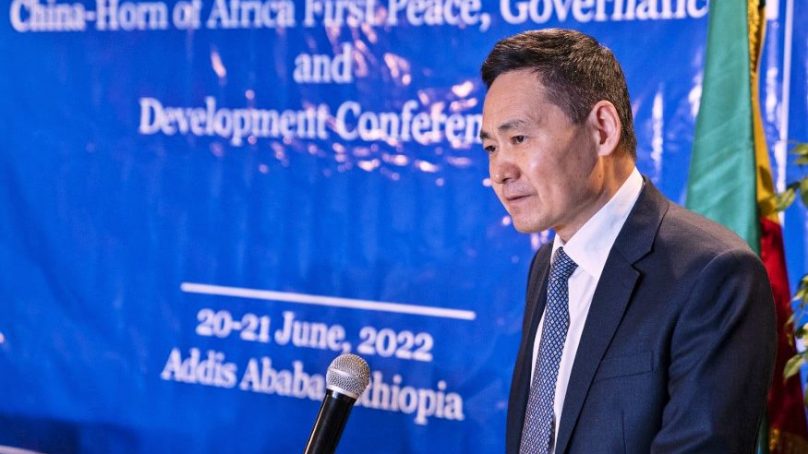
At the outset of the conflict in Tigray in November 2020, China worked with the Ethiopian military to evacuate 600 Chinese citizens from the massive Wolkaiyt sugar refinery near the frontlines and a water project near Mekelle run by the Gezhouba Group, one of China’s largest energy state-owned enterprises.
In March 2021, China and Ethiopia established a “security safeguarding mechanism” to protect Chinese investments in Ethiopia.
The African Centre for Strategic Studies (ACSS), China’s Horn of Africa initiative in Ethiopia stands in contrast to its engagement in South Sudan in 2013, which was distinctive for its constructiveness. China was motivated to engage in South Sudan given its investments in oil pipelines, wells, and export infrastructure.
In a statement released on October 13, ACSS observes that working closely with the ongoing mediation initiated by the late US envoy, Princeton Lyman, China’s then Special Representative on African Affairs Zhong Jianhua skillfully brought together key warring factions to the table.
“Building on the two diplomats’ close personal and professional relationship, this was one instance where China came close to playing a mediator role in the classical sense. Not only was it willing to talk to all sides but it also supported a larger multilateral process,” ACSS says.
It observes further that China does not seem enthusiastic about working with Western envoys or becoming part of existing multilateral initiatives in its latest initiative, however.
China has justified this stance by saying that Ethiopian Prime Minister Abiy Ahmed and other leaders are “fed up with the foreign intervention, the preaching from Western countries,” and that countries in the region say “China respects us, treats us as equals, and so they want to see China playing [a] more active [and] constructive role.” This justification of China’s role is consistent with the regime-centric nature of its efforts.
“In practical terms, this posture seems intended to ingratiate China to Abiy while advancing China’s geostrategic posture in the region. Ethiopia is one of China’s closest military and economic partners in Africa. Moreover, Ethiopia’s $13.7 billion debt to Chinese lenders raises its profile in Chinese calculations. Tigray supporters point to this economic leverage as further evidence of China’s unfitness to mediate,” the ACSS statement points out.
It explains that understanding the economic interests at stake in any conflict is a critical consideration for achieving peace.
“Otherwise, economic investments can reinforce pre-existing patterns of inequality. One way out is to address economic inequality as part of any peace negotiation and ensure that economic development is organic to the peace process,” the statement quotes Kwezi Mngqibisa who worked on the Burundi peace process under former South African President, Nelson Mandela.
It goes on, “Mandela was adamant that donor pledges moved hand-in-hand with the peace process and that development priorities were identified by the parties in the context of the talks. It was a lesson that other mediators borrowed.”
ACSS is concerned that China’s approach reveals gaps when examined against African mediation principles. The 12 mediation guidelines in the AU Mediation Handbook include impartiality, inclusion of all significant political actors, involvement of civil society, a non-threatening venture for all parties, ownership by the parties and addressing root causes.
So far, the “Outlook on Peace and Development in the Horn of Africa” falls short of these requirements – meaning there is need for deeper consultation with African institutions and experts, ACSS explains.
“It would be more accurate to look at Xue not as a mediator but as an envoy sent to the region to protect Chinese economic interests.”
There are also differences in content and focus. Professor Gilbert Khadiagala, who advised the AU Panel of the Wise, explains that, first, a credible mediation would have to sound out the other existing mediators to ease its entry into the process, which was not done.
Second, China is wary of imposing itself in political conflicts that it has no control over: it would rather sell the BRI packages to all the players without necessarily having an overtly political engagement. Hence, it would be more accurate to look at China’s special envoy to the Horn of Africa, Xue Bing, not as a mediator but as an envoy sent to the region to protect Chinese economic interests.”
Meanwhile, the timing and sequencing of China’s new initiative has not followed African templates. Had Chinese diplomats incorporated lessons from Nelson Mandela and other renowned mediators, then they would have met the Tigray People’s Liberation Front (TPLF) after meeting the government, assessed the readiness of both sides to talk, identified the core issues, and secured a “no objection” from them to mediate.
They would have followed up by shuttling between the two sides to prepare the groundwork for direct talks. All this would have been done in close coordination with the AU’s special envoy, Obasanjo.
China’s approach of strengthening ruling regimes in its Horn initiative means it is not viewed as an impartial actor – breaking a core rule of mediation. China also appears to be using mediation as a means to support its geostrategic interests.
“Mediation, in contrast, is a process whereby a trusted actor with experience, leverage, intimate knowledge of conflict resolution, and moral suasion brings parties to the table to resolve grievances in a safe environment,” ACSS points out.
Over the years, it says, African diplomats have demonstrated considerable expertise in building such trust and impartiality, producing a long line of mediators that have tackled some of the most vexing crises on the continent.
It will thus be critical for African stakeholders to make their voices heard, bring their knowledge to bear, and take the driver’s seat in any mediation and peacebuilding efforts in the Horn. It is on this basis that they can most constructively invite external actors to contribute.
- A Tell / ACSS report











